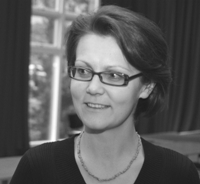The British International Studies Association (BISA) is a learned society that promotes the study of international relations and related subjects through teaching, research, and facilitation of contact between scholars. BISA has an international membership of over 1,500 members, with over 80 countries represented. Chair is Mark Webber (University of Birmingham). He succeeded Richard Whitman (University of Kent), who served as chair until 2015. The national office is based at the University of Birmingham.
BISA is a member society of the Academy of Social Sciences.
In Jan 1974 an inaugural meeting was held at the 14th Bailey Conference on International Studies at the University of Surrey, and at that time, a draft interim constitution was agreed. The interim executive committee consisted of Alastair Francis Buchan (chairman), RJ Jones (secretary), Susan Strange (treasurer), PA Reynolds, G Goodwin, D Wrightman, CM Mason, T Taylor, A James and J Spence.
BISA awards the following prizes at its annual international conference:
Working groups are formed by members to enable collaboration and networking in specific subfields. There are currently about 30 groups focusing on specific areas of study and collaboration.
The association makes available funding via a variety of routes, working group funding, conference bursaries, founders fund awards, postgraduate network funding etc. Introduced in 2015, BISA also offers funding for Early Career Researchers’ projects with grants of up to £3,000.
The Fulbright Program, including the Fulbright–Hays Program, is one of several United States Cultural Exchange Programs with the goal of improving intercultural relations, cultural diplomacy, and intercultural competence between the people of the United States and other countries through the exchange of persons, knowledge, and skills. Via the program, competitively-selected American citizens including students, scholars, teachers, professionals, scientists, and artists may receive scholarships or grants to study, conduct research, teach, or exercise their talents abroad; and citizens of other countries may qualify to do the same in the United States.
The Europaeum is a network of eighteen universities in Europe. It was conceived of in 1990–1991 by Lord Weidenfeld and Sir Ronnie Grierson and they persuaded Roy Jenkins, who had just become Chancellor of the University of Oxford, to push this initiative in conjunction with the universities of Leiden, and Bologna. It has subsequently been supporting the "advancement of education through the encouragement of European studies in the University of Oxford and other European institutions of higher education having links with Oxford."

The University of Konstanz is a university in the city of Konstanz in Baden-Württemberg, Germany. Its main campus was opened on the Gießberg in 1972 after being founded in 1966. The university is Germany's southernmost university and is situated on the shore of Lake Constance just four kilometres from the Swiss border. It has been successful in all three funding lines of the Excellence Initiative, and is therefore one of Germany's elite "Universities of Excellence", a group of prestigious universities often considered the German Ivy League. The university is ranked in top 100 worldwide in the field of social policy and administration in the 2020 QS World University Rankings, and ranked 51 in Political Science according to the 2020 ShanghaiRanking. The U.S. Department of Energy also refers to the University of Konstanz as a "small Harvard".
The Society for Historians of American Foreign Relations (SHAFR) was founded in order to "promote excellence in research and teaching of American foreign relations history and to facilitate professional collaboration among scholars and students in this field around the world." It has nearly 1,200 members in over forty countries. It hosts an annual conference, and publishes the quarterly Diplomatic History. It also publishes a triennial newsletter, Passport. SHAFR has increasingly fostered connections with international historians and organizations.
The International Social Science Council (ISSC) was an international non-governmental organization promoting the social sciences, including the economic and behavioural sciences. It was founded in Paris, France between 6 and 9 October 1952, under the auspices of UNESCO, following a Resolution at the 6th UNESCO General Conference in 1951. It was adopted on 19 September 1972, completed and revised on 14 November 1979, and underwent multiple revisions on 17 December 1985, 3 December 1992, 27 November 1998, 8 November 2006, and finally 10 December 2010. ISSC was registered in accordance with French Law.
The European Consortium for Political Research (ECPR) is a scholarly association that supports and encourages the training, research and cross-national cooperation of many thousands of academics and graduate students specialising in political science and all its sub-disciplines. ECPR membership is institutional rather than individual and, at its inception in 1970, comprised eight members. Membership has now grown to encompass more than 350 institutions throughout Europe, with associate members spread around the world.
The Missouri School of Journalism housed under University of Missouri in Columbia is one of the oldest formal journalism schools in the world. The school provides academic education and practical training in all areas of journalism and strategic communication for undergraduate and graduate students across several media platforms including television and radio broadcasting, newspapers, magazines, photography, and new media. The school also supports an advertising and public relations curriculum.

Susan Strange was a British scholar who was "almost single-handedly responsible for creating international political economy." Notable publications include Sterling and British Policy (1971), Casino Capitalism (1986), States and Markets (1988), The Retreat of the State (1996), and Mad Money (1998).

The European University Institute (EUI) is an international postgraduate and post-doctoral teaching and research institute and an independent body of the European Union with juridical personality, established by the member states to contribute to cultural and scientific development in the social sciences, in a European perspective. EUI is designated as an international organisation. It is located in the hills above Florence in Fiesole, Italy. In 2021, EUI's School of Transnational Governance, with its graduate and executive programmes, moved to the Casino Mediceo di San Marco, which is a late-Renaissance or Mannerist style palace in the historic centre of Florence.
Christian Reus-Smit is Professor of International Relations (IR) at the University of Queensland, in Brisbane Australia. He is an internationally renowned scholar in the field of IR. Reus-Smit's research focuses on the institutional nature and evolution of international orders, and he has published on widely on issues of international relations theory, international law, multilateralism, human rights, American power, and most recently, cultural diversity and international order. He is long-time editor of the Cambridge Studies in International Relations book series, and was a Founding Editor with Duncan Snidal and Alexander Wendt of the leading journal International Theory. His publications have been awarded many prizes, including the Susan Strange Best Book Prize (2014), the BISA Best Article Prize (2002), and the Northedge Prize (1992). In 2013-14 Professor Reus-Smit served as a Vice-President of the International Studies Association.
The British Association for Applied Linguistics (BAAL) is a learned society, based in the UK, which provides a forum for people interested in language and applied linguistics.

The Centre for Research in the Arts, Social Sciences and Humanities (CRASSH) is an interdisciplinary research centre within the University of Cambridge. Founded in 2001, CRASSH came into being as a way to create interdisciplinary dialogue across the University’s many faculties and departments in the arts, social sciences, and humanities, as well as to build bridges with scientific subjects. It has now grown into one of the largest humanities institutes in the world and is a major presence in academic life in the UK. It serves at once to draw together disciplinary perspectives in Cambridge and to disseminate new ideas to audiences across Europe and beyond.

The Freiburg Institute for Advanced Studies (FRIAS) is the international research college of the University of Freiburg, Germany. The institute was initially part of the university's proposal for funding in the Excellence Initiative in 2007, an initiative by the German Federal Ministry of Education and Research and the German Research Foundation with the aim of promoting both cutting-edge research and enhancing the international success of German higher education institutions.

Elena Korosteleva is a dissident academic researcher and principal investigator focusing on governance, democratisation, complexity and resilience. She is Professor of Politics and Global Sustainable Development and Director of the Institute for Global Sustainable Development at the University of Warwick and is visiting professor at the Oxford Belarus Observatory at the Oxford University.
The Development Studies Association (DSA) is a scholarly society. It was formally established at the National Development Research Glasgow Conference in 1978 and currently has 35 institutional members and 400 individual and student members. It is governed by a Council made up of academics and practitioners working in international development elected at the Annual General Meeting.

The Alliance of Digital Humanities Organizations (ADHO) is a digital humanities umbrella organization formed in 2005 to coordinate the activities of several regional DH organizations, referred to as constituent organizations.
Tebello Nyokong is a South African chemist and distinguished professor at Rhodes University, and a recipient of South Africa's Order of Mapungubwe. Nyokong's work has been published around 450 times including a patent. She was awarded the South African Chemical Institute Gold Medal in 2012, and named one of the Top 10 Most Influential Women in Science and Technology in Africa by IT News Africa. She is currently researching photo-dynamic therapy, an alternative cancer treatment method to chemotherapy. In 2007, she was one of the top three publishing scientists in South Africa, and in 2013 she was awarded the National Research Foundation's Lifetime Achievement Award.
Rosemary O'Leary is Emeritus Distinguished Professor at the Maxwell School of Syracuse University and Emeritus Distinguished Professor at the University of Kansas. Her research focuses on public management, collaboration, conflict resolution, environmental and natural resources management, and public law.

Hazel Jane Read Hall is a British Information scientist and academic. She is Emeritus Professor in the School of Computing, Engineering, and Built Environment at Edinburgh Napier University, Scotland and Docent in Information Studies in the School of Business and Economics at Åbo Akademi University, Finland.
Mark Webber is a British political scientist and international relations specialist whose research interests include the international politics of the former Soviet Union, contemporary Russian foreign policy, foreign policy analysis (FPA), politics of NATO and European Union enlargement, security studies, and comparative international organisations. He is a professor of International Politics at the University of Birmingham, where between 2011 and July 2019 he was the Head of the School of Government and Society. He was also the Head of the Department of Politics, History and International Relations at Loughborough University.